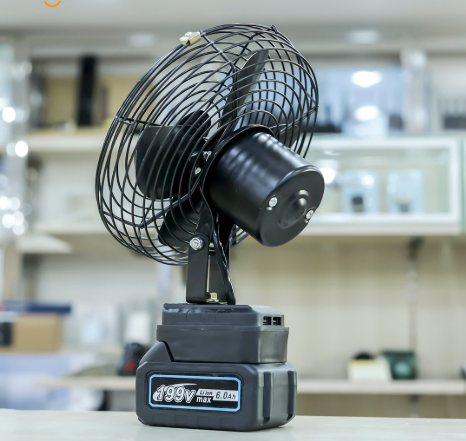When the summer heat becomes unbearable, choosing the right cooling solution can make all the difference. The debate of electric fan vs air conditioner is a common one, as both devices offer unique benefits and drawbacks. Whether you’re looking to save on energy costs, prioritize portability, or achieve maximum cooling power, understanding the differences between an electric fan and an air conditioner is essential. In this comprehensive guide, we’ll explore how these two cooling options compare in terms of performance, cost, maintenance, and more, while providing practical electric fan tips and insights to help you make an informed decision. For more detailed cooling advice, check out our cooling guide.
What is an Electric Fan?
An electric fan is a portable, cost-effective device that circulates air to create a cooling effect. Unlike air conditioners, fans don’t lower the room’s temperature; they move air around to make you feel cooler through evaporation of sweat on your skin. Fans come in various types, such as tower fans, pedestal fans, and portable electric fans, making them versatile for home or office use.
Setting up an electric fan is straightforward. Most models require minimal electric fan setup, often just plugging in the device and selecting your desired speed. Fans are lightweight, easy to move, and don’t require complex installation, unlike air conditioners. However, they’re less effective in extreme heat or high humidity, as they rely on air movement rather than temperature reduction.
What is an Air Conditioner?
An air conditioner, on the other hand, is a more powerful cooling system that actively lowers the temperature of a room by removing heat and humidity. Available in window units, portable models, or central systems, air conditioners are ideal for creating a consistently cool environment, even in scorching conditions. They’re particularly effective in humid climates where fans may fall short.
While air conditioners provide superior cooling, they come with higher costs, both in terms of initial purchase and energy consumption. Installation can also be more complex, especially for window or central units, requiring professional assistance in some cases. Maintenance, such as cleaning filters or checking refrigerant levels, is also more involved compared to electric fan maintenance.
Key Differences: Electric Fan vs Air Conditioner
To help you decide between an electric fan and an air conditioner, let’s break down the key differences across several factors, including cost, cooling performance, energy efficiency, and ease of use.
1. Cooling Performance
When it comes to cooling power, air conditioners have a clear advantage in the electric fan vs air conditioner debate. Air conditioners can lower a room’s temperature significantly, often by 10–20°F, and they also dehumidify the air, making the environment feel more comfortable. This makes them ideal for hot, humid climates where precise temperature control is needed.
Electric fans, while effective at creating a breeze, don’t actually cool the air. They work best in moderate temperatures or dry climates, where air circulation can enhance comfort. For example, a portable electric fan can be a great choice for a small room or personal space, but it won’t match the cooling power of an air conditioner in extreme heat. To maximize your fan’s performance, check out our electric fan tips for proper placement and usage.

2. Cost and Affordability
One of the biggest advantages of an electric fan is its affordability. Fans are significantly cheaper to purchase, with basic models starting as low as $20–$50, while high-end models with advanced features like oscillation or remote control may cost $100–$200. Air conditioners, by contrast, can range from $150 for a small portable unit to over $1,000 for a window or central system, not including installation costs.
Operating costs also differ. Electric fans use far less electricity, typically consuming 20–100 watts per hour, compared to air conditioners, which can use 500–3,500 watts depending on the unit’s size and efficiency. For budget-conscious households, a fan is a cost-effective way to stay comfortable without breaking the bank.
3. Energy Efficiency
In the electric fan vs air conditioner comparison, fans are the clear winner for energy efficiency. Because they only circulate air, fans consume minimal electricity, making them an eco-friendly choice. Air conditioners, while more efficient than in the past due to advancements like inverter technology, still require significant power to cool and dehumidify a space. If you’re looking to reduce your carbon footprint or lower your energy bills, a fan is the better option, especially if paired with proper electric fan maintenance to keep it running efficiently.
4. Portability and Ease of Use
Portability is another area where electric fans shine. A portable electric fan can be easily moved from room to room, requiring only a power outlet to operate. This makes fans ideal for small apartments, dorm rooms, or offices where flexibility is key. How to use an electric fan is also intuitive—most models have simple controls for speed and oscillation, and setup takes just minutes.
Air conditioners, while available in portable models, are generally heavier and less convenient to move. Window units require semi-permanent installation, and central systems are fixed in place. For those who value mobility and simplicity, a fan is the better choice.
5. Maintenance and Cleaning
Both devices require regular upkeep, but electric fan maintenance is generally simpler and less costly than air conditioner maintenance. Electric fan cleaning involves basic tasks like wiping down blades, removing dust from grilles, and ensuring the motor is free of debris. These tasks can be done at home with minimal tools, and our maintenance tips provide a step-by-step guide to keeping your fan in top shape.
Air conditioners, however, require more involved maintenance, such as cleaning or replacing filters, checking refrigerant levels, and inspecting coils. Neglecting these tasks can lead to reduced efficiency or costly repairs. If you’re not comfortable with DIY maintenance, you may need to hire a professional, adding to the overall cost.
Electric Fan Troubleshooting and Safety
While electric fans are generally reliable, occasional issues may arise. Common problems include unusual noises, reduced airflow, or motor malfunctions. Electric fan troubleshooting often involves checking for loose parts, cleaning the blades, or ensuring the fan is placed on a stable surface. Regular electric fan cleaning can prevent many issues, as dust buildup can strain the motor and reduce performance.
Electric fan safety is also important. Always ensure the fan is placed away from water sources to avoid electrical hazards, and never leave it running unattended for extended periods. For air conditioners, safety concerns include proper installation to prevent leaks or electrical issues, as well as regular maintenance to avoid mold growth in humid environments.

Best Use Cases for Electric Fans
Electric fans are ideal for specific scenarios, including:
- Small spaces: A portable electric fan is perfect for personal use in a bedroom, office, or dorm.
- Budget-conscious households: Fans are affordable to buy and run, making them a great choice for saving money.
- Moderate climates: In areas with mild summers or low humidity, fans can provide sufficient cooling.
- Supplemental cooling: Fans can complement an air conditioner by improving air circulation, allowing you to set the AC to a higher temperature to save energy.
For a detailed best electric fan guide, including tips on choosing the right model, visit our cooling guide.
Best Use Cases for Air Conditioners
Air conditioners are better suited for:
- Hot and humid climates: AC units excel at cooling and dehumidifying, making them ideal for tropical or coastal regions.
- Large spaces: Central or window units can cool entire homes or large rooms more effectively than fans.
- Health considerations: For individuals with respiratory issues or allergies, air conditioners with filters can improve indoor air quality.
- Consistent cooling: If you need precise temperature control, an air conditioner is the better choice.
How to Clean an Electric Fan vs Air Conditioner Maintenance
Keeping your cooling device in top condition is crucial for performance and longevity. How to clean an electric fan is relatively simple:
- Unplug the fan for safety.
- Remove the front grille and blades (refer to the manual for your model).
- Wipe down blades and grilles with a damp cloth and mild detergent.
- Use a vacuum or compressed air to remove dust from the motor housing.
- Reassemble and test the fan.
Air conditioner maintenance is more complex and may include:
- Cleaning or replacing air filters every 1–3 months.
- Checking and cleaning evaporator and condenser coils.
- Ensuring proper drainage to prevent clogs or leaks.
- Scheduling professional servicing annually for optimal performance.
Regular upkeep for both devices ensures they run efficiently and safely. For more electric fan maintenance tips, check out our comprehensive guide at electricfanatic.com.
Which Should You Choose?
In the electric fan vs air conditioner debate, the best choice depends on your needs, budget, and environment. If you’re looking for an affordable, portable, and energy-efficient option for mild climates or small spaces, an electric fan is the way to go. With proper electric fan setup and maintenance, a fan can provide reliable cooling at a fraction of the cost of an air conditioner.
However, if you live in a hot, humid climate or need to cool a large space, an air conditioner is the better investment. While it comes with higher upfront and operating costs, its ability to lower temperatures and control humidity makes it unmatched for extreme conditions.
Conclusion
Choosing between an electric fan vs air conditioner ultimately comes down to your specific needs. Electric fans offer affordability, portability, and ease of use, making them a great choice for budget-conscious users or those in moderate climates. Air conditioners, while more expensive, provide powerful cooling and dehumidification for hotter, more humid environments. By understanding the strengths and limitations of each, you can make an informed decision that keeps you comfortable all summer long. For more tips on how to use an electric fan or maintaining your cooling devices, visit electricfanatic.com for expert advice and resources.